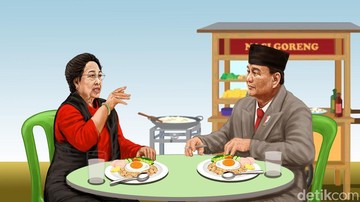PDIP: Kami Tak Ada Masalah dengan Presiden Prabowo!

Mediagaleryjati.biz.id Mudah mudahan kalian sehat dan berbahagia selalu. Kini saya ingin berbagi tentang POLITIK yang bermanfaat. Pandangan Seputar POLITIK PDIP Kami Tak Ada Masalah dengan Presiden Prabowo Jangan diskip ikuti terus sampai akhir pembahasan.
Table of Contents
Introduction to Political Dynamics
Political landscapes often shift, and understanding the dynamics at play can provide insight into future developments. The relationships between major political parties and their leaders are crucial to grasping the nuances of governance. Recently, the PDIP has made statements regarding its stance toward President Prabowo, which has raised eyebrows and sparked discussions among political analysts and the public alike.
This reveals an underlying tension or harmony in political alliances that can significantly shape policy and public perception. What lies beneath the surface of PDIP's reassurances? This exploration will delve deeper into the implications of these affirmations and what they mean for Indonesia's political climate.
Historical Context of PDIP and Prabowo
The PDIP, or Indonesian Democratic Party of Struggle, has a rich history intertwined with the country's political evolution. Since its inception, it has played a pivotal role in Indonesian politics, often positioning itself against military-based politics. President Prabowo, who has historical ties to the military, adds an interesting layer to this relationship.
Understanding their historical interactions is essential to comprehending the current political landscape. From alliances to rivalries, the past influences present sentiments, often dictating party positions and electoral strategies.
Current Political Climate in Indonesia
The current political climate in Indonesia is characterized by competing interests among various parties, highlighting the necessity for coalitions and mutual agreements. PDIP's confidence in its relationship with President Prabowo points to a calculated approach in navigating these complexities.
In an atmosphere often marked by polarization, strategic alliances become vital for ensuring stability and governance. This context provides a backdrop to the statements made by PDIP, shedding light on their potential motivations and future strategies.
Analyzing PDIP's Affirmations
PDIP's assertion of having no issues with President Prabowo merits a thorough examination. These declarations could be interpreted as strengthening their political position and reassuring their constituency. The strategic communication used by the party reflects an understanding of public sentiment and the need for transparency.
This openness could serve the dual purpose of alleviating concerns and fortifying alliances while projecting a united front amidst fluctuating public opinion. Considering the implications of such statements, it raises the question: what are the underlying objectives of PDIP's posited harmony with Prabowo?
Potential Implications for Policy Making
The alignment—or perceived alignment—between PDIP and President Prabowo could have profound implications for policymaking in Indonesia. A united front can facilitate smoother legislative processes and expedite the implementation of reforms needed in various sectors such as health, education, and infrastructure.
Conversely, any discord emerging from this relationship could lead to legislative gridlock and public dissatisfaction. It is crucial to explore how these dynamics will evolve over time and their potential impact on Indonesia's governance and policy direction.
Voter Sentiment and Public Perception
Voter sentiment is a critical factor in shaping political alliances and strategies. The remarks from PDIP regarding their relationship with Prabowo may be an attempt to appeal to a broader base. By presenting a positive public image, they strive to quell doubts among constituents while fostering confidence in their leadership.
Understanding how the electorate responds to these declarations is paramount. Political analysts will undoubtedly be watching closely to see if these strategies resonate with voters and what that might portend for future elections.
The Role of Media in Political Relationships
The media plays a central role in shaping public understanding of political relationships. Coverage of the interactions between PDIP and President Prabowo can influence perception, framing it as either adversarial or collaborative. The narrative crafted by journalists and analysts will significantly impact public opinion.
A media landscape that supports a harmonious relationship may bolster confidence in both parties, while portrayals of tension could exacerbate existing uncertainties. Observing media trends will be crucial for evaluating how these dynamics evolve.
Future Outlook for PDIP and Prabowo Alliance
Looking ahead, the future of the PDIP and President Prabowo’s collaboration remains uncertain. Both parties must navigate a complex landscape of internal and external pressures while maintaining their political integrity. As the political landscape continues to shift, adaptability will be essential.
As we survey the horizon, one can ponder the potential paths forward—whether collaborative or contentious—illustrating the intricacies of Indonesian politics in the years to come. What remains clear is that the dialogue between these two political entities will play a pivotal role in shaping Indonesia's future direction.
Sekian ulasan komprehensif mengenai pdip kami tak ada masalah dengan presiden prabowo yang saya berikan melalui politik Terima kasih atas kepercayaan Anda pada artikel ini cari inspirasi positif dan jaga kebugaran. Jangan segan untuk membagikan kepada orang lain. semoga Anda menemukan artikel lain yang menarik. Terima kasih.
✦ Tanya AI
Saat ini AI kami sedang memiliki traffic tinggi silahkan coba beberapa saat lagi.